“Pig” (“Khook”) (2018 production, 2019 release). Cast: Hassan Majooni, Leila Hatami, Leili Rashidi, Parinaz Izadyar, Siamak Ansari, Ainaz Azarhoush, Ali Bagheri, Mina Jafarzadeh, Ali Masaffa. Director: Mani Haghighi, Screenplay: Mani Haghighi. Web site. Trailer.
What does it mean to be liked? That can be a loaded question, depending on the context. But, in an age of omnipresent social media (and the social ostracism that often accompanies it, which can take myriad forms, again depending on the context), that question can become even more precarious. And, on top of all that, our responses to those circumstances can be truly mind-boggling. These are just some of the issues faced by an insecure citizen in an insecure society in the offbeat new Iranian dark comedy, “Pig” (“Khook”).
Filmmaker Hasan Kasmai (Hassan Majooni) is supremely frustrated. Once one of Iran’s most popular and respected directors, Hasan now finds himself on the outs, having been blacklisted by the government as a creator of subversive movies. Unable to get his proposed projects approved, he’s been relegated to directing TV commercials for innocuous products like bug spray. He still tries to bring his signature style to these “productions,” but it’s not the same, especially when he must sit back and watch filmmakers he considers less talented able to get work.
Hasan is also upset that his star actress (and mistress), Shiva Mohajer (Leila Hatami), is about to be cast in a production directed by one of his rivals, Sohrab Saidi (Ali Masaffa), a filmmaker Hasan considers pretentious, overrated and lacking in ability. Hasan pleads with Shiva to reconsider taking the part, but she says she can no longer wait for his name to be cleared from the blacklist; after several years of patiently waiting for Hasan to return to the ranks of active auteurs, she says she needs the work to maintain her profile and simply can’t wait any longer.
[caption id="attachment_10545" align="aligncenter" width="300"] Blacklisted filmmaker Hasan Kasmai (Hassan Majooni) spends his days and nights distracting himself from his troubles by playing tennis, going to costume parties and engaging in other assorted diversions in the raucous new Iranian dark comedy, “Pig” (“Khook”). Photo courtesy of Daricheh Cinema.[/caption]
Blacklisted filmmaker Hasan Kasmai (Hassan Majooni) spends his days and nights distracting himself from his troubles by playing tennis, going to costume parties and engaging in other assorted diversions in the raucous new Iranian dark comedy, “Pig” (“Khook”). Photo courtesy of Daricheh Cinema.[/caption]
As this little drama plays out, however, an even bigger one is unfolding. Mysteriously, a number of Iran’s other filmmakers (especially subversive ones) are being murdered, beheaded in graphic fashion, with the results displayed under highly visible conditions and the word “pig” carved into their foreheads. It’s a subject on everyone’s mind in the public at large and Iran’s film community in particular, including Hasan, but for reasons that aren’t the same as most everyone else. He wonders why he hasn’t become a target himself. He’s “insulted” at being “passed over,” something that only further feeds his insecurities and makes him feel even more “left out.” Most look upon this worry in wonder, believing that he should be grateful for being spared. But not Hasan – he’s tired of being shunned, even under such gruesome circumstances. He consequently seeks ways to get involved in the mystery, hoping it will resurrect his profile and popularity – and maybe even draw the killer his way.
In the meantime, Shiva begins work on Sohrab’s film, a development that infuriates Hasan. He even believes that the director may be trying to woo the actress away from him, a notion that leads to embarrassing public incidents and strained relations between him and Shiva. Needless to, say, Hasan grows even more despondent and isolated.
Others try to cheer up Hasan, such as his elderly, doting, occasionally foul-mouthed mother, Jeyran (Mina Jafarzadeh), who ardently believes her baby can do no wrong and who’s willing to go to extreme lengths to protect him against any threats, no matter how great or incidental. Then there’s Hasan’s longtime friend and tennis partner, Homayoun (Siamak Ansari), who’s willing to indulge his pal’s whims, no matter how looney some of them may be. But, regardless of how much help his supporters provide, they never seem to satiate Hasan’s bottomless appetite for recognition and attention.
As time passes, the heat gets turned up considerably. Hasan finds himself being pursued by a persistent stalker, Annie (Parinaz Izadyar), who claims she’s smitten with the filmmaker and is interested in finding a way of becoming cast in his next production (whenever that will be), even though her unpredictable actions often make these contentions questionable. But, even more troublesome than that, claims circulate against Hasan that he’s killing the other directors (after all, accusers claim, how has he managed to survive while all of the others are dying?). Those accusations get fueled with further speculation when he’s placed near the scene of one of the murders, but, when Hasan is questioned by an investigator (Ali Bagheri), he’s cleared of all suspicion. Nevertheless, when word of his possible connection to the crimes is leaked to social media, he’s tried and found guilty in the court of public opinion, despite the authorities’ finding of innocence.
[caption id="attachment_10546" align="aligncenter" width="300"] Long sidelined from the acting scene, leading lady Shiva Mohajer (Leila Hatami) returns to moviemaking over the objection of her blacklisted lover and collaborator in the inventive new Iranian dark comedy, “Pig” (“Khook”). Photo courtesy of Daricheh Cinema.[/caption]
Long sidelined from the acting scene, leading lady Shiva Mohajer (Leila Hatami) returns to moviemaking over the objection of her blacklisted lover and collaborator in the inventive new Iranian dark comedy, “Pig” (“Khook”). Photo courtesy of Daricheh Cinema.[/caption]
Ironically, Hasan suddenly has more popularity than what he knows to do with, but it’s far from the kind of notoriety he’s been seeking. What’s he to do to clear his falsely accused name and restore his reputation? That’s the challenge he now faces, one that perches him perilously on multiple fronts. And it’s bigger than anything he’s had to confront thus far.
In addressing these issues, the first question Hasan (or anyone else similarly situated) needs to ask is, “Is the popularity we seek worth the cost of what it takes to attain it?” It’s an age-old question in many ways, but it’s become particularly important in a hyperconnected world with ubiquitous social media, on-demand Internet access and constant (if often-uninformed) scrutiny by others. Indeed, is the result truly worthy of the effort needed to acquire it?
That naturally depends on the value we place on this sought-after commodity. And that, in turn, is based on the beliefs we hold on the subject. That’s crucial, because they will determine what arises given that our beliefs are the driving force behind the conscious creation process, the philosophy that maintains we manifest the reality we experience through the power of our thoughts, beliefs and intents.
Given where Hasan is coming from, he has much to sort out for himself. But, before he can implement any corrective measures, he needs to decide what’s most important in his life. What gives him meaning? What provides genuine satisfaction? What does he want for his future? And what beliefs does he need to formulate to realize these outcomes?
[caption id="attachment_10547" align="aligncenter" width="300"] Blacklisted filmmaker Hasan Kasmai (Hassan Majooni, right) and his longtime friend, Homayoun (Siamak Ansari, left), partake in an array of wild schemes to solve a series of murder mysteries while restoring the director’s reputation in the hilarious new Iranian dark comedy, “Pig” (“Khook”). Photo courtesy of Daricheh Cinema.[/caption]
Blacklisted filmmaker Hasan Kasmai (Hassan Majooni, right) and his longtime friend, Homayoun (Siamak Ansari, left), partake in an array of wild schemes to solve a series of murder mysteries while restoring the director’s reputation in the hilarious new Iranian dark comedy, “Pig” (“Khook”). Photo courtesy of Daricheh Cinema.[/caption]
Hasan obviously craves attention and hopes that others like him, partly to get his career back on track, but also simply to rejuvenate others’ appreciation of him as a human being. Those objectives are intertwined with one another to a certain degree, which is why his inability to work is so painful to him. And, because of that, he’s willing to do almost anything to get back on track.
Of course, when we become obsessed like this, we may be tempted to do just about anything to attain our goal, and that may lead to the formation, deployment and maintenance of ill-considered beliefs. That’s apparent, for example, in Hasan’s misguided notion that he’s somehow less of a filmmaker (and, consequently, less of an individual) because the serial killer hasn’t targeted him for beheading. Such a distorted, misguided belief subsequently leads to all kinds of genuinely bizarre materializations, considerations that most anyone in his or her right mind would never seek to manifest. It leads to such wacky developments as his consoling mother trying to comfort him by saying that he needn’t fret about not being sought by the murderer, that he should rest assured that the killer will come around eventually because he’s “saving the best for last” (how’s that for a mother’s love?). It also leads to the stalker’s appearance, the suspicion that Hasan might be a suspect in the killings and his desire to become involved in the case in hopes that his efforts at solving the crimes will help to draw popularity-building attention to him.
What madness this is! Yet, if Hasan is upset with any of these developments, he has no one to blame but himself, since these manifestations are arising from his beliefs. That’s what can happen when we become so focused on an outcome that we give no thought to the consequences that can accompany its materialization. This is un-conscious creation or creation by default in full flower.
So what can we do to avoid this? First and foremost we need to place our faith in the workings of our divine collaborator, our trusty partner in the conscious creation process. When we state a desired intent and then let it go for our co-creator to act upon it, we’re more likely to get the result we want than if we try to manhandle the process, wrestling it to the ground to force our objective into being, a practice known as “pushing the Universe.” As seasoned conscious creators are well aware, the Universe naturally leans in our direction, so we should let it do its work, based on our input, rather than try to control a process that we’re not nearly as adept at managing as our collaborator is. If we’re impatient with the unfolding of the process or try to strong-arm the outcome, we’re likely to end up sorely disappointed, saddled with a distorted version of what we seek, as well as a host of unintended side effects that need to be resolved. It’s a lesson Hasan is sorely in need of learning – and before it’s too late. Indeed, it would seem the beleaguered filmmaker has his work cut out for him.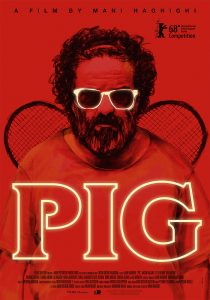
Director Mani Haghighi’s Farsi-cal crime story is quite an unexpected treat. Given the kinds of films that typically come out of Iran, one likely wouldn’t think that a dark comedy such as this would be among the releases. Nevertheless, this hilarious romp serves up big laughs amidst its many intriguing twists and turns. At the same time, the picture delivers a number of insightful, subtle observations about social media, the meaning of fame, and a host of other political and civic issues. What’s more, this exceedingly polished offering resembles contemporary Western releases much more than most of its homegrown peers, with gorgeous cinematography, snappy writing, high-quality production values, and influences from a variety of sources, including music videos, the films of the Coen Brothers and other outlets. The picture has a slight tendency to meander at times, but everything seemingly extraneous ends up playing a part in the end, making for a taut, well-told tale. Sensitive viewers should be aware, however, that there is some graphic imagery in this one; it never gets out of context, but it may still be more than some moviegoers can handle. “Pig” may be a little hard to find, but it’s worth a look if you have the chance.
Many of us would probably say that we’d like to be liked. But at what cost? How far are we willing to go to achieve the popularity we claim to crave? And at what point does the cost become too high? That’s something we each need to determine for ourselves, but the answers may take some scrutiny to determine exactly what we’re willing to do – and how far we’re willing to go – to attain that attention. Be sure to remember, though, as this film sternly cautions, it’s not something worth losing your head over.
Copyright © 2019, by Brent Marchant. All rights reserved.
Thursday, February 28, 2019
‘Pig’ asks, ‘What’s the price of popularity?’
Tuesday, February 26, 2019
‘Isn’t It Romantic’ muses about the true nature of love
“Isn’t It Romantic” (2019). Cast: Rebel Wilson, Liam Hemsworth, Adam Devine, Priyanka Chopra, Brandon Scott Jones, Betty Gilpin, Jennifer Saunders, Alexandra Kis, Ray Anthony Lewis, Zach Cherry, Sandy Honig, Dean Neistat. Director: Todd Strauss-Schulson. Screenplay: Erin Cardillo, Dana Fox and Katie Silberman. Story: Erin Cardillo. Web site. Trailer.
What does it take to love someone? The answer may surprise you, as its origins actually stem from a source that might not be recognized at first glance. But making that realization is crucial if we ever hope to find that true love, an insight pursued in earnest in the delightful new romantic comedy parody, “Isn’t It Romantic.”
When pudgy 12-year-old Aussie Natalie (Alexandra Kis) gawks at a screening of the 1990 romantic fantasy “Pretty Woman,” she longs for the same kind of happily-ever-after ending for herself experienced by lead characters Richard Gere and Julia Roberts. But that wide-eyed wonder is summarily quashed by the hard-edged cynicism of her mother (Jennifer Saunders), who tells her daughter that such outcomes are unrealistic for common folk like them. Needless to say, Natalie is crushed, but she nevertheless takes the “advice” as gospel.
Fast forward to the present day, when a twenty-something Natalie (Rebel Wilson) is now an architect living in New York. However, despite the seeming prestige such a position should offer, she’s often put upon by co-workers (Zach Cherry, Sandy Honig) who ask her to perform menial tasks for them or even do their jobs. Even her personal assistant, Whitney (Betty Gilpin), is of little help, ignoring her responsibilities and spending her days endlessly watching romantic comedies on her computer. About the only person in her corner is her co-worker Josh (Adam Devine), who actively seeks to court her friendship and build up her morale. But even that encouragement does little to bolster her spirits when she’s treated shabbily during a project presentation by one of the firm’s clients, Blake (Liam Hemsworth), a terminally handsome but arrogant businessman who thoughtlessly assumes she’s the coffee girl and not the professional that she is.
Such treatment only reinforces the general malaise she feels about her life. With little respect at her office, no looming romantic prospects and even a pet dog that ignores her, Natalie feels like life is passing her by, but she accepts and expects that, an attitude that echoes the sentiments planted in her mind by her mother all those years ago. She even chastises Whitney for wasting so much time watching her silly movies, claiming that those pictures, like the film she gawked at as a youngster, paint an implausible picture of romance. Natalie recites a litany of clichés that characterize the pictures of that genre and itemizes how their narratives fill the heads of their viewers with naïve, unrealistic notions about love.
After yet another unfulfilling day at work, while riding home on the New York City subway, Natalie gets hit on by a flirty stranger (Dean Neistat). Unfortunately, the would-be suitor turns out to be a mugger. But, despite an attempt at snatching Natalie’s purse, the attacker is unprepared for his victim’s ability to fight back, an effort at which she nearly succeeds – were it not for running into a support beam and knocking herself unconscious.
When Natalie awakens, she finds herself in an emergency room unlike anything she’s ever seen. The designer hospital suite looks more like something from an interior decorator’s studio than a health care facility. The attending physician is a hunk, and flowers adorn everything. And, upon release, Natalie discovers an outdoor streetscape that resembles the set of a Hallmark movie.
Natalie naturally wonders how New York ended up looking like this. Gone are the grubbiness and the foul smells to which she’s grown accustomed. And everywhere she looks she sees couples madly in love. Given that everything she’s witnessing goes against her views about reality, she’s convinced she’s got to find a way to escape and get back to the existence that she knows and … loves?
Yet, as she makes her way through this alternate existence, she finds virtually everything is now working to her benefit. Her apartment has been transformed into something out of Architectural Digest. Her dog adores her. And Blake, the client who previously treated her like dirt, is now head over heels in love with her.
But is this allegedly perfect reality everything it’s cracked up to be? Whitney, for example, has suddenly been transformed from a warm and supportive colleague into a wicked witch. Josh, though still in Natalie’s corner, has taken a shine to a super model, Isabella (Priyanka Chopra). Blake, despite his claims of undying love, reveals that his affection comes with strings. So, given all that, is this really where Natalie wants to stay? And, if not, how does she escape?
The answer is not out of reach, but Natalie will need to discover where to look, and that may prove challenging. However, if she really wants to make a change – one that ultimately involves more than just a return to the reality she knows – she’ll have to take on that challenge. And the answer to that may surprise her – and us.
The quest to find the meaning of true love can take many twists and turns. And, since most of us are born without a guidebook, that can turn the search into an exercise in trial and error. We may look at the examples set by others. We may attempt winging it on our own. Or we may look to others for advice, as Natalie does in consulting her best friend and next-door neighbor, Donny (Brandon Scott Jones), the sort of unattached, flamboyant but infinitely wise gay man who often makes for a staple rom-com character. But, in the end, given that we have engaged in this search, perhaps we should consider starting with ourselves to see what we bring to the table of romance. Once we do that, we may find our quest much easier to fulfill.
Of course, much depends on our beliefs about love, as they determine what unfolds in our life, thanks to the conscious creation process, the philosophy that maintains we manifest the reality we experience through the power of these metaphysical building blocks. And, given Natalie’s life, it’s apparent she holds some clearly defined beliefs about love, all of which characterize the nature of her romantic experience.
In Natalie’s case, we can go back to an early point in her life to see where these beliefs took shape, and clearly she’s conflicted. While watching “Pretty Woman,” for example, she willingly bought into the fairy tale aspect of love. But, in turn, she also embraced the sour outlook of her mother, a polar opposite attitude. This set of divergent beliefs has combined to create the antagonistic views she maintains. And, as conscious creators well know, contradictions like this are one of the chief causes of our hoped-for manifestations remaining unmaterialized.
Unfortunately, this attitude has permeated other aspects of her life as well. Disappointment and low expectations have creeped into other areas, affecting her overall outlook. She obviously doesn’t expect much romantically speaking, but that attitude has also left her with comparable views about her career, her living circumstances and even her relationship with her pet.
So, if she ever hopes to turn things around, what is Natalie to do? She needs to look to herself and what she hopes for out of life. If she continues to maintain such a dismal approach to her existence, it’s easy to see what she’ll get in return. But, if she were to believe that she deserves better, then perhaps she might realize a different outcome. And that is what triggers her alternate reality experience. It affords her an opportunity to see what else is possible, to get a glimpse of what alternatives she can experience besides what she’s typically known.
However, to make this happen, Natalie has to be the one to do the work, specifically where her manifesting beliefs are concerned. A different result won’t arise from the outside; it must begin from within. Natalie must change her views, particularly when it comes to her expectations, and that largely has its origins in such areas as self-esteem and self-love.
This is obvious to outsiders like Whitney and, especially, Josh. They try to encourage Natalie to see the worth she possesses and to demand more for herself, especially when it comes to her dealings with others, such as possible romantic partners, co-workers and even her dog. Interestingly, this is something from which many of us could probably benefit, but, for what it’s worth, many of us are like Natalie in that we don’t see it in ourselves. If there’s any takeaway we should glean from this film, that would be it. Should we do that, we might all be a lot happier in our lives, not just romantically but in all aspects of our existence.
“Isn’t It Romantic” explores what true love really means and where it originates. While at times a bit belaboring and at other times somewhat underdeveloped, the film is a generally charming rom-com parody reminiscent of the fun-filled independent production “(500) Days of Summer” (2009), albeit somewhat more commercial. The picture delivers lots of laughs and nice sentiments about matters that go beyond romance. Rebel Wilson shows that she can carry a lead role effectively, serving up the goods at every turn. And the film’s skewering of romantic comedy clichés, such as the inclusion of several impromptu, perfectly choreographed, over-the-top music video sequences, is an absolute hoot.
For something that we place so much attention on, you’d think that we’d all be experts by now when it comes to this thing called love. If only that were true. But that’s not to say we can’t master it with the right attitude, the right outlook and a willingness to put in the work to figure it out. After all, for those of us who’ve succeeded at this, we can honestly say that the effort is well worth it. And that truly is romantic.
Copyright © 2019, by Brent Marchant. All rights reserved.
This Week in Movies with Meaning
Reviews of "Isn't It Romantic" and "Pig," as well as my Oscar scorecard, are all in the latest Movies with Meaning post on the web site of The Good Media Network, available by clicking here.



Monday, February 25, 2019
How’d I Do on This Year’s Oscars?
With this year’s Academy Awards ceremony behind us, it’s time to take a look at how I did on my predictions for the winners in this annual competition, as first outlined in my previous blog, “Who Will Win This Year's Oscars?”, posted on February 7. This was a difficult season to handicap, but I was generally pleased with the results, even when I was wrong in my predictions.
So how did I do? Four out of six correct calls, with two misses (and qualified ones at that). Here are the details:
Best Picture
Projected Winner: “Roma”
Actual Winner: “Green Book”
Result: Missed call (sort of)
This has become the most difficult category to call in recent years, largely because it’s been hard to discern the mind of the Academy voters. What’s more, there were four films actively in the running for this award, based on the results from competitions leading up to the Oscars. Going in, “Roma,” “Green Book,” “Bohemian Rhapsody” and “Black Panther” all had legitimate shots.
In my predictions blog, I called “Roma” the winner for a variety of reasons. However, much to my surprise, on awards night, the statue went to “Green Book,” which seemed more like a long shot than a shoo-in among the leading contenders.
Not that I’m disappointed with the choice; after all, “Green Book” was the No. 2 film on my list of 2018’s top 10. Even though many onlookers and critics have been inexplicably disappointed by the choice, I’m pleased that Oscar voters recognized this picture’s many strengths and made the right decision, picking the film that deserved to win. After all, there were precedents for this film, having taken top honors from the National Board of Review and at the Golden Globe Awards.
To my own credit, ahem, I did say that “Green Book” was the nominee that should win. So, given that this ended up being the case, I’ll gladly take a half-credit on this one (because I can!). Maybe I’ll get the mood of the voters right in future years.
Best Actor
[caption id="attachment_10269" align="alignnone" width="300"] Rami Malek. Photo by Alex Bailey @ 2018 Twentieth Century Fox Film Corporation. [/caption]
Rami Malek. Photo by Alex Bailey @ 2018 Twentieth Century Fox Film Corporation. [/caption]
Projected Winner: Rami Malek, “Bohemian Rhapsody”
Actual Winner: Rami Malek, “Bohemian Rhapsody”
Result: Correct call
This was a two-horse race between Rami Malek and Christian Bale for “Vice.” Initially they were splitting the accolades in the run-up to the Oscars, but, in recent weeks, Malek began to pull away. It’s not much of a surprise, then, that he came across the finish line first.
Best Actress
[caption id="attachment_10328" align="alignnone" width="300"] Olivia Colman. Photo by Yorgos Lanthimos, © 2018 Twentieth Century Fox Film Corporation. [/caption]
Olivia Colman. Photo by Yorgos Lanthimos, © 2018 Twentieth Century Fox Film Corporation. [/caption]
Projected Winner: Glenn Close, “The Wife”
Actual Winner: Olivia Colman, “The Favourite”
Result: Missed call (sort of)
By all accounts, this looked like it was finally going to be Glenn Close’s year. Having won virtually everything leading up to the Oscars, and having seemingly been a sentimental favorite with six previous nominations and no wins, it appeared the seventh time would be the charm for her fine performance in “The Wife.” Not so. The statue went to Olivia Colman for her brilliant portrayal of England’s Queen Anne in “The Favourite.”
However, even though my prediction was incorrect, this was another case where I was not disappointed with the result. Colman was the nominee who I said should win, and thankfully she did (I’ll take another half-credit on this one, thank you very much). While it must have been disappointing for Close to be passed over yet again, I’m pleased that Academy voters recognized the truly best performance in this category.
So how did I miss on this one? I suspect that it was due to a momentum shift that took place at the BAFTA Awards in early February, where Colman bested Close for the best actress award, the first time that had happened during awards season. Based on results in other acting categories in recent years, it seems that the BAFTAs are an awards competition to watch, since this contest seems to be where momentum shifts, if any, occur. Something to bear in mind for future prediction blogs!
Best Supporting Actor
[caption id="attachment_10302" align="alignnone" width="300"] Mahershala Ali. Photo courtesy of Universal Pictures, Participant Media and DreamWorks. [/caption]
Mahershala Ali. Photo courtesy of Universal Pictures, Participant Media and DreamWorks. [/caption]
Projected Winner: Mahershala Ali, “Green Book”
Actual Winner: Mahershala Ali, “Green Book”
Result: Correct call
This was pretty much a no-brainer. Ali had won virtually everything leading up to the Oscars, and he was truly the class of the field (even though he had formidable competition from all of his fellow nominees). It was good to see another deserving performance take home the win.
Best Supporting Actress
[caption id="attachment_10403" align="alignnone" width="300"]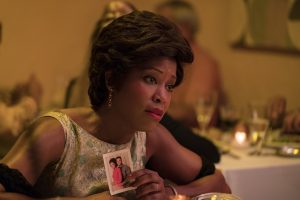 Regina King. Photo by Tatum Mangus/Annapurna Pictures © 2018 Annapurna Releasing, LLC.[/caption]
Regina King. Photo by Tatum Mangus/Annapurna Pictures © 2018 Annapurna Releasing, LLC.[/caption]
Projected Winner: Regina King, “If Beale Street Could Talk”
Actual Winner: Regina King, “If Beale Street Could Talk”
Result: Correct call
This was a difficult category to handicap, as it could have conceivably gone to any of the nominees (and it wasn’t an especially strong lineup of candidates). King had the early season momentum, but it was unclear if she’d be able to hold onto it, given that she wasn’t even nominated in the last two major competitions before the Oscars. In the end, though, it seems she had enough gas left in the tank to hold on and take home the prize.
Best Director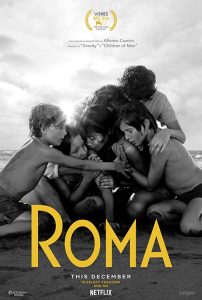
Projected Winner: Alfonso Cuarón, “Roma”
Actual Winner: Alfonso Cuarón, “Roma”
Result: Correct call
This was another no-brainer. Having won everything leading up to the Oscars, this was his award to lose. Even though I believed there were other more worthy candidates, such as Yorgos Lanthimos for “The Favorite,” this was Cuarón’s year, and his win proved that.
Oscar® and Academy Award® are registered trademarks of the Academy of Motion Picture Arts & Sciences.
Copyright © 2018, by Brent Marchant. All rights reserved.
Wednesday, February 20, 2019
Frankiesense Goes to the Oscars
Join me and host Frankie Picasso for our annual look at the Oscars on Frankiesense & More on The Good Media Network, Thursday February 21 at 1 pm ET. For the video version, tune in on Facebook Live by clicking here. And, for the audio only podcast edition, check out The Good Media Network’s home page by clicking here.
Tuesday, February 19, 2019
The Oscars Are Coming!
The Oscars are only a few days away. Who will take home the top prizes? Find out on the latest edition of Self Discovery Media's Choose Positive Living with host Sara Troy, available by clicking here.

Tune in for The Cinema Scribe
Tune in for the latest Cinema Scribe segment on Bring Me 2 Life Radio, today, February 19, at 2 pm ET, by clicking here. And, if you don't hear it live, catch it later on demand!

Monday, February 18, 2019
This Week in Movies with Meaning
Reviews of "Gavagai" and "Blame," as well as three podcast previews, are all in the latest Movies with Meaning post on the web site of The Good Media Network, available by clicking here.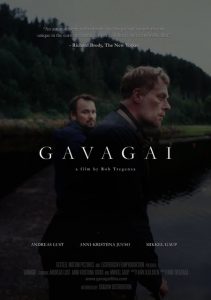




Saturday, February 16, 2019
Who will win this year's Oscars? Get an inside, irreverent look at the annual awards contest with yours truly on the latest edition of TheCoffeeCast with host Tom Cheevers, available by clicking here. Tune in for some fun, feisty, lively chat, but please note the explicit language warning!
Tuesday, February 12, 2019
The Best and Worst of 2018

Monday, February 11, 2019
‘Gavagai’ thoughtfully examines life’s big issues
“Gavagai” (2016 production, 2018 release). Cast: Andreas Lust, Mikkel Gaup, Anni-Kristiina Juuso. Director: Rob Tregenza. Screenplay: Kirk Kjeldsen and Rob Tregenza. Web site. Trailer.
The road of life is full of twists and turns, many of them unexpected. How we address them is crucial, for they help to shape the individuals we become, which, in turn, further shape the lives we continue to experience. But, in the midst of the hubbub of everyday existence, sometimes we lose sight of this, thereby drawing attention to the need to consider what we hope will come out of life’s challenges. Such is the experience of a pair of unlikely traveling companions in the meditative new release, “Gavagai.”
Affluent German businessman Carsten Neuer (Andreas Lust) has a heavy burden weighing upon him. Having recently lost his wife, a translator of the works of famed Norwegian poet Tarjei Vesaas, he feels compelled to honor her memory by finishing a project she started, translating the poet’s verse from its native tongue into Chinese. Given the significant language differences, the undertaking is considered virtually impossible. However, Carsten believes that completing his late wife’s work is the best way to pay respects to her, no matter how difficult the venture might be.
To seek inspiration for this, Carsten decides to travel to rural Norway, Vesaas’s birthplace, hoping that walking in the poet’s footsteps will help to put him in a proper frame of mind for finishing this translation. However, there are a few challenges with that. Logistically speaking, the poet’s birthplace is somewhat remote, so simply getting there takes some effort. To make the journey easier, Carsten hires a guide/driver, Niko (Mikkel Gaup), to take him there. Although Niko is initially reluctant, he quickly relents when he learns of the hefty fee Carsten is willing to pay him, money that will come in handy in light of the pittance he’s earning from his business as a wildlife tour operator.
[caption id="attachment_10504" align="aligncenter" width="300"] German businessman Carsten Neuer (Andreas Lust) seeks to come to terms with his grief over the loss of his wife while on a trip to rural Norway in the thoughtful new cinematic tone poem, “Gavagai.” Photo courtesy of Shadow Distribution.[/caption]
German businessman Carsten Neuer (Andreas Lust) seeks to come to terms with his grief over the loss of his wife while on a trip to rural Norway in the thoughtful new cinematic tone poem, “Gavagai.” Photo courtesy of Shadow Distribution.[/caption]
This challenge pales in comparison to Carsten’s bigger issue – he misses his wife terribly, and his despair seriously distracts him from carrying out his mission, despite his apparent heartfelt sincerity for wanting to see it through. She’s constantly on his mind, diverting his attention from the project and keeping him from finding the peace of mind he so desperately seeks. Even being in the poet’s homeland doesn’t help to inspire him as much as he thought it would. However, his journey does evoke thoughts and images of a mystical nature, even though they’re not the sort he was expecting or hoping for. Instead of visions and insights that remind him of the author, he’s flooded with memories and apparitions of his late wife, distracting him even more and hampering his work.
To complicate matters, Carsten is quietly irritated by his guide. Niko and his client are anything but compatible. The lively, burly, affable Niko frequently tries to engage him in conversation and camaraderie, something in which the sullen Carsten has no interest. In fact, were it not for their business arrangement, Carsten would otherwise probably have nothing to do with him. But, as their journey together unfolds, it becomes apparent that they benefit from one another’s company as each of them needs a friend. Carsten can use a consoling companion to help him work through his grief, while Niko needs someone to help him come to terms with the news that his girlfriend, Mari (Anni-Kristiina Juuso), is pregnant with his child.
Through their travels together, Carsten and Niko seek to make peace with their issues – and with one another – so that they can move on in their lives. In doing so, they deal with the big issues – love, loss, life, death, friendship, maturity and the motivation to carry on under changing circumstances. The visions and insights that come to them during their journey help to provide them with the means to address these issues, both practically and philosophically. The experiences may be difficult, even painful, but they’re also transformative, helping them to realize what they need to do to get through their respective transitions.
In telling this story, director Rob Tregenza employs a quiet, meditative approach, cinematically fusing what’s going on in both the characters’ lives and minds. The imagery is complemented by narrated excerpts of Vesaas’s works, showing how the poet’s verse reflects the thoughts and impressions of the protagonists. When combined with the picture’s beautiful cinematography and its ethereal score, the film takes viewers on a vicarious metaphysical journey of their own, one designed to provoke thought and provide them with examples of how they can maneuver their way through the challenges of their own lives.
The cinematic merging of actions with underlying thoughts, as well as depictions of alternate paths of existence to the ones on which we find ourselves, makes for an inspired metaphysical tutorial. This is particularly true when it comes to illustrating the conscious creation process, the philosophy that maintains we manifest the reality we experience through the power of our thoughts, beliefs and intents. And, given that Carsten and Niko are each going through significant life changes, such instruction can be invaluable to them, as well as to those of us who are going through comparable circumstances.
Given where Carsten and Niko are at in life, they’re faced with significant changes to the lives they’ve known. They’re each trying to figure out why these alterations are happening and how they might cope with their new circumstances. And, considering the scope involved, they’re each up against formidable challenges in their attempts to move forward. But, before they proceed with developing the beliefs needed to formulate new plans, they must first come to terms with what they’re leaving behind – and believe that it is, in fact, time to let go of their old lives.
Like a butterfly emerging from a cocoon, the protagonists each struggle with their respective losses – Carsten of the passing of his beloved, Niko of the passing of his carefree days of independence – and their attempts at envisioning what lies ahead. For Carsten, this means a fresh start; he’s a relatively young man in good health and has the second half of his life ahead of him. And, as for Niko, this means finally settling down and taking responsibility for his life, especially now that his existence will be tied up in the lives of two others. Those represent significant adjustments to what they’ve known, so allowing themselves the time and space needed to accept and grow comfortable with these changes is thus crucial to let go of their pasts and turn the pages of their lives.
[caption id="attachment_10505" align="aligncenter" width="200"] The beauty of the rural Norwegian landscape provides the backdrop for two unlikely traveling companions in the meditative new release, “Gavagai.” Photo courtesy of Shadow Distribution.[/caption]
The beauty of the rural Norwegian landscape provides the backdrop for two unlikely traveling companions in the meditative new release, “Gavagai.” Photo courtesy of Shadow Distribution.[/caption]
As they work through this process, they each come upon some intriguing realizations. For instance, their lives are, like the nature of the story, innately poetic. The voiceovers interspersed throughout the film illustrate this fittingly, showing how the characters’ beliefs, outlooks and actions are aptly reflected in the realities surrounding them. Is it any wonder, then, how anyone could doubt that our lives are indeed poetic representations of our minds?
Some specific elements of the story draw particular attention to this. For example, Carsten makes his journey to complete his wife’s work on a translation of Vesaas’s verse from Norwegian into Chinese, a project that that he freely acknowledges is virtually impossible. He clearly grapples with the task, reaching for words that can’t possibly do proper justice to the original sentiment. It really is the proverbial square peg and round hole conundrum. But, for Carsten, this is a quandary that he struggles with in more ways than just trying to complete a poetry translation. His quest to make the impossible possible also applies to his longing for his wife; he wants to be with her again, but it’s a quest that’s simply not achievable, no matter how much he seeks its fulfillment.
Coming to grips with the realization that certain impossibilities are genuinely unattainable is thus essential to Carsten’s odyssey of letting go and moving on. Only by accepting that fundamental truth and sincerely believing in its veracity can he make himself ready for the next chapter. The poetry project serves as a subtle but significant allegory of this notion, one based on beliefs he’s devised and must now come to understand and appreciate. This is far from easy, but it’s truly necessary to make the break he needs to move on.
Throughout all of this, the concepts of birth, death and rebirth are undeniably conspicuous in each of the protagonists’ lives, both literally and metaphorically. These big issues of life are something we seldom take the time to seriously ponder – that is, until events seemingly force our hand into doing so. Yet, given that our reality springs forth from our thoughts, beliefs and intents, these contemplative forays into our consciousness actually originate with us as well, often in the form of co-creations between us and others (in this case between Carsten and his wife, between Niko and his girlfriend, and, in its own way, between Carsten and Niko).
As we go about the business of daily life, most of us would probably just as soon not think about such matters. But, since they’re all inevitable parts of our existence, it would behoove us to take the time to give them some consideration, for how we address them in the here and now will ultimately have influence over how we experience them in the hereafter – and beyond. Getting our heads – and our beliefs – right about such issues is undoubtedly a productive use of our time, something we should make a practice of doing on occasion, and “Gavagai” serves as helpful reminder of this practice.
Of course, in finding meaning on such matters, we must each determine this for ourselves, given that there’s no universal, one-size-fits-all concept or explanation that applies to all of us. To assume otherwise is fruitless, and trying to make it happen in life (and death) is akin to what Carsten and his wife have attempted to undertake in their poetry translation. The inherent inscrutability in such ventures – be it in explaining the meaning of life or translating something from one language to another – is at the heart of what “gavagai” means, both as a made-up word from a nonexistent language and in the central message of this film. But, then, as conscious creators are well aware, finding our own meaning through our own beliefs is also at the heart of what it takes to manifest our individual realities and what constitutes them.
If it’s not apparent by now, “Gavagai” is not a picture to be viewed casually. Director Tregenza’s ambitious attempt at getting a handle on such heady issues as these is certainly commendable. Telling a meditative tale of life, love, death, loss, friendship and carrying on in the context of a road trip buddy movie in the wilds of the Norwegian countryside is certainly inventive, one that in many ways is reminiscent of the thoughtful cinematic tone poem “Columbus” (2017). However, the film’s sometimes-cryptic narrative and cinematography weave a story that often feels padded and somewhat underdeveloped. Nice sentiments and heartfelt emotions permeate the film, but sometimes they’re depicted through photographic sequences that would benefit from some much-needed editing to make them more manageable -- and meaningful. Enjoy this one as much as you can, and take time to appreciate the thoughtfulness it encourages in each of us, but don’t be surprised if it also starts to try your patience after a while.
Life goes by fast, sometimes a lot more quickly than we realize. Needless to say, it’s a precious resource we should never squander, one that we should appreciate and make the most of. But, to do that, sometimes we need to stop and take some time to assess it – what’s happened, what we’d like to happen and where we’re going. Periodically giving thought to the big issues that shape it, particularly the bookends that define it, would be in our best interests. Indeed, we should hope that, by doing so, we can avoid that regretful outcome of which Pink Floyd once sang so eloquently, “The time is gone, the song is over. Thought I’d something more to say.”
Copyright © 2019, by Brent Marchant. All rights reserved.
Thursday, February 7, 2019
Who Will Win This Year’s Oscars?
It’s that time of year again – time for my predictions of the winners at the upcoming annual Academy Awards. Handicapping this year’s winners has been a little more difficult than usual, since there don’t appear to be any clear-cut front runners in several categories, and the nominees in many of the contests leading up to the Oscars have been inconsistent at best. Nevertheless, with that said, here are my picks for who will likely take home statues in the top six categories this year:
Best Actor
[caption id="attachment_10269" align="alignnone" width="300"] Oscar nominee portrays Rami Malek portrays Freddie Mercuty, lead singer of the legendary rock band Queen, in “Bohemian Rhapsody.” Photo by Alex Bailey @ 2018 Twentieth Century Fox Film Corporation.[/caption]
Oscar nominee portrays Rami Malek portrays Freddie Mercuty, lead singer of the legendary rock band Queen, in “Bohemian Rhapsody.” Photo by Alex Bailey @ 2018 Twentieth Century Fox Film Corporation.[/caption]
The Field: Christian Bale, “Vice”; Bradley Cooper, “A Star Is Born”; Willem Dafoe, “At Eternity’s Gate”; Rami Malek, “Bohemian Rhapsody”; Vigo Mortensen, “Green Book”
Who Will Likely Win: Rami Malek. This is one of the more difficult categories to call, since most of the awards bestowed in the run-up to the Oscars have been split between Malek and Christian Bale for “Vice” (and it’s not inconceivable that Bale could walk away with the statue on Oscar night). Both actors are portraying real-life characters, which stands them in good stead with Academy voters, since they usually cast their ballots for historic figures over fictional ones if given a choice. And both performers have turned in outstanding portrayals of their characters. However, when it comes to comparing the likability factor of the charismatic Freddie Mercury (Malek’s character) to the curmudgeonly Dick Cheney (Bale’s character), Malek gets an edge, since Hollywood prefers to honor performances of nice, inspiring individuals over glum, self-absorbed sorts. Also, considering the wider range of actions and activities required to portray Mercury – singing, stage antics, not to mention acting – compared to the mostly sedentary Cheney, this gives Malek another plus in his favor. I think this one could come right down to the wire, but I would give the edge to Malek over Bale. Then again, I could be wrong.
Who Should Win (Based on the Nominees): I would be happy with any of the nominees in this field taking home the Oscar with one exception – Bradley Cooper. His portrayal is commendable though weaker than those of his peers, showing once again, in my view, that he’s a capable, but largely one-note, actor. Malek, Bale, Dafoe and Mortensen are all superb, eminently worthy of their nominations – and potential wins.
Who Should Win (Based on All Eligible Candidates): As much as I greatly enjoyed the work of Malek, Bale, Dafoe and Mortensen, my favorite lead male performance of the year was Ethan Hawke in “First Reformed.” Hawke turned in a gut-wrenching, emotionally charged portrayal whose impact was palpable, one that I could feel viscerally as I watched it. When the film was first released last summer, Hawke was generating a lot of buzz for this performance, with many critics rightly calling it the best of his career, and I heartily concurred. Sadly, however, this role was mostly forgotten by awards season, picking up nominations in only two major competitions, the Critics Choice Awards and the Independent Spirit Awards. It’s regrettable that this work has gone largely overlooked.
Possible Dark Horse: Viggo Mortensen. Admittedly, Mortensen is very much a long shot at this point, but he can’t be completely ruled out, given that he won the best actor award presented by the National Board of Review. However, since he has not earned any additional awards since then, it appears that whatever momentum he once had has since been lost.
Also-Rans: Willem Dafoe, Viggo Mortensen and Bradley Cooper. These three performers should be content with the nominations (especially Cooper, who doesn’t belong here in my opinion).
Who Should Have Been Left Out: Bradley Cooper, as noted above. This slot should have gone to any number of other more deserving performances, as discussed below.
Who Else Should Have Been Considered: 2018 was a good year for lead actor performances, so much so that it must have been difficult narrowing down the field to five candidates. In addition to Ethan Hawke (see above), others whom I believe merited consideration include Lucas Hedges for both “Boy Erased” and “Ben Is Back,” Joaquin Phoenix for both “Don’t Worry, He Won’t Get Far on Foot” and “You Were Never Really Here,” John C. Reilly and Steve Coogan both for “Stan & Ollie,” Robert Redford for “The Old Man & the Gun,” Ben Mendelssohn for “The Land of Steady Habits,” Lakeith Stanfield for “Sorry To Bother You,” John David Washington for “BlacKkKlansman,” Ben Foster for “Leave No Trace,” Hugh Jackman for “The Front Runner,” Stephan James for “If Beale Street Could Talk” and Zain Al Rafeea for “Capernaum” (“Chaos”).
Best Actress
[caption id="attachment_10116" align="alignnone" width="300"]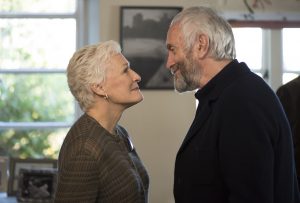 Oscar nominee Glenn Close (left) portrays a loyal, king-making spouse to a Nobel Prize-winning author (Jonathan Pryce, right) in “The Wife.” Photo by Graeme Hunter, courtesy of Sony Pictures Classics.[/caption]
Oscar nominee Glenn Close (left) portrays a loyal, king-making spouse to a Nobel Prize-winning author (Jonathan Pryce, right) in “The Wife.” Photo by Graeme Hunter, courtesy of Sony Pictures Classics.[/caption]
The Field: Yalitza Aparicio, “Roma”; Glenn Close, “The Wife”; Olivia Colman, “The Favourite”; Lady Gaga, “A Star Is Born”; Melissa McCarthy, “Can You Ever Forgive Me?”
Who Will Likely Win: Glenn Close. The veteran performer has been at the front of the pack since this film was released at the beginning of awards season, and this is one of the few categories over which a nominee would appear to have a virtual lock. As a sentimental favorite who has now been nominated seven times without a win, there seems to be a widely held but mostly unspoken attitude that she’s owed an Oscar and that this is the opportunity to bestow one upon her. But is being overdue for an award a legitimate reason for giving one to a previously unrecognized performer? I’m always troubled when the Oscars do that, and it happens more often than it should. To her credit, this is the best of Close’s nominated performances, showing more of a range here than in her other portrayals. But is that enough? Having won virtually everything in this category up to this point, Close appears to be a shoo-in for the award. Look for her to take home the statue on Oscar night.
Who Should Win (Based on the Nominees): Olivia Colman. This is an outstanding performance, and it’s high time that this journeyman actress has finally received a plum part in which she can really show off what she can do. She received the Golden Globe Award for best actress in a comedy for this performance, but, given the Close juggernaut, it doesn’t look like she’ll be able to overtake the front runner.
Who Should Win (Based on All Eligible Candidates): As with the lead actor category, 2018 offered us a huge pack of viable nominees in this category. I would have a difficult time narrowing it down to one candidate. I’d lean heavily toward Colman, though good cases could be made for other contenders, including fellow nominee Melissa McCarthy, as well as a number of other actresses who were not nominated, such as Rosamund Pike for “A Private War,” Susan Sarandon for “Viper Club,” Julia Roberts for “Ben Is Back” and Emily Blunt for “Mary Poppins Returns.”
Possible Dark Horse: Lady Gaga. Actually, the term “dark horse” is something of an understatement where this nominee is concerned, since she is the one contender who might have a chance – and a fairly good one at that – to knock Close off her pedestal. Having won the National Board of Review’s award for best actress and tying with Close in this category at the Critics Choice Awards, she just might have enough clout to pull off a win over the favorite. Such upsets don’t happen often, but they’re not unknown, and this could be one of them.
Also-Rans: Olivia Colman, Melissa McCarthy and Yalitza Aparicio. It’s unfortunate to think of Colman and McCarthy as also-rans, but, unfortunately, that’s likely how they’ll end up, despite the strength of their performances. And, as for Aparicio, it’s hard to fathom how she even scored a nomination considering her utterly lackluster performance, but it’s a portrayal that has also-ran written all over it (more on this below).
Who Should Have Been Left Out: Yalitza Aparicio. Considering how she mumbled her way through the role, Aparicio has no place in this field of contenders. As for how she made the cut, I believe she benefitted from the “Roma” juggernaut, getting swept up into its haul of nominations, regardless of whether or not it was deserved (which it clearly is not). There are so many other more deserving actresses who were left out that her inclusion was a huge Oscar gaffe.
Who Else Should Have Been Considered: In addition to Pike, Sarandon, Roberts and Blunt (as discussed above), other worthy candidates include Charlize Theron for “Tully,” Elsie Fisher for “Eighth Grade,” Saoirse Ronan for “Mary, Queen of Scots,” Felicity Jones for “On the Basis of Sex,” Nicole Kidman for “Destroyer” and Joanna Kulig for “Cold War” (“Zimna wojna”).
Best Supporting Actor
[caption id="attachment_10302" align="alignnone" width="300"] Mahershala Ali portrays pianist Dr. Don Shirley who embarks on a concert tour of the Deep South in 1962 in the fact-based biopic, “Green Book.” Photo courtesy of Universal Pictures, Participant Media and DreamWorks.[/caption]
Mahershala Ali portrays pianist Dr. Don Shirley who embarks on a concert tour of the Deep South in 1962 in the fact-based biopic, “Green Book.” Photo courtesy of Universal Pictures, Participant Media and DreamWorks.[/caption]
The Field: Mahershala Ali, “Green Book”; Adam Driver, “BlacKkKlansman”; Sam Elliott, “A Star Is Born”; Richard E. Grant, “Can You Ever Forgive Me?”; Sam Rockwell, “Vice”
Who Will Likely Win: Mahershala Ali. If there’s anyone in the acting categories who already has an award sown up, it would be Ali for his stellar performance in “Green Book.” He’s won virtually everything leading up to the Oscars, and I don’t see anyone else in the field who can stage a realistic challenge.
Who Should Win (Based on the Nominees): Mahershala Ali. As good as this field of nominees is, Ali is hands down the best. Even though he won a supporting actor Oscar for “Moonlight” just two years ago, his performance here is even better, and he truly deserves the award.
Who Should Win (Based on All Eligible Candidates): Mahershala Ali. Are we seeing a trend here? Again, even though there were many worthy performances in this category – nominated or not – Ali truly is at the top of the pack among eligible supporting actors.
Possible Dark Horse: Sam Elliott. Elliott is the only actor to have defeated Ali in any of this year’s competitions, having captured the National Board of Review award for his excellent performance in “A Star Is Born.” As a sentimental favorite who has turned in years’ worth of solid work and has never even been nominated before (let alone won), there’s a slight chance he might pull off an upset, though I wouldn’t bet on it. He should be content with his nomination as his award.
Also-Rans: Adam Driver, Richard E. Grant and Sam Rockwell. It seems a shame to call them also-rans given the strength of their performances, but these three actors, unfortunately, don’t have enough momentum behind them to take home the statue. Driver and Grant are indeed excellent in their roles, though they don’t have the oomph they need to propel them to victory. Rockwell is superb as well, though having just won in this category a year ago for “Three Billboards Outside Ebbing, Missouri,” it’s highly unlikely that Oscar voters will honor him again so soon after his previous win.
Who Should Have Been Left Out: No one! Everyone who is in this category deserves to be here. There are others who are worthy as well (see below), but, with a field limited to five nominees, not everyone who’s deserving can make the cut.
Who Else Should Have Been Considered: There were many excellent supporting actor performances in 2018, and, as good as the nominees are, there are others who merited attention, including Jonathan Pryce and Christian Slater both for “The Wife,” Timothée Chalamet for “Beautiful Boy,” Michael B. Jordan for “Black Panther,” Lin-Manuel Miranda for “Mary Poppins Returns,” Steve Carell for “Vice,” Joel Edgerton for “Boy Erased,” Robert Forster for “What They Had,” Bruce Dern for “Chappaquiddick,” Cedric Kyles for “First Reformed,” Jack Black for “Don’t Worry, He Won’t Get Far on Foot” and Rufus Jones for “Stan & Ollie.”
Best Supporting Actress
[caption id="attachment_10403" align="alignnone" width="300"] Concerned mother Regina King does her best to help out her daughter and son-in-law-to-be in the screen adaptation of author James Baldwin’s “If Beale Street Could Talk.” Photo by Tatum Mangus/Annapurna Pictures © 2018 Annapurna Releasing, LLC.[/caption]
Concerned mother Regina King does her best to help out her daughter and son-in-law-to-be in the screen adaptation of author James Baldwin’s “If Beale Street Could Talk.” Photo by Tatum Mangus/Annapurna Pictures © 2018 Annapurna Releasing, LLC.[/caption]
The Field: Amy Adams, “Vice”; Marina de Tavira, “Roma”; Regina King, “If Beale Street Could Talk”; Emma Stone, “The Favourite”; Rachel Weisz, “The Favourite”
Who Will Likely Win: Regina King. Having won Golden Globe, Critics Choice and National Board of Review honors in this category, she appeared perched to steamroll her way through awards season, and she’s still probably the front runner in this race. However, having not even been nominated in the Screen Actors Guild and BAFTA contests, the last two major competitions before the Oscars, it could be that her support is softening and that a change is in the offing for the February 24 ceremony. To an extent that’s understandable, given that this is a good though not great performance. Nevertheless, in a year when this category’s pool of nominees was unusually weak (truly out of character for the supporting actress award), King’s portrayal is one of the more solid performances in the field. I think she still has enough momentum to hold on for the win, but, if that changes, all bets would quickly be off (see below).
Who Should Win (Based on the Nominees): Emma Stone or Rachel Weisz. In my view, they turned in the best supporting actress performances of 2018, both among nominees and the total universe of contenders, and they are both truly deserving, either individually or in one of Oscar’s rare ties. However, given that both have already earned Oscars – Weisz for “The Constant Gardener” (2005) and Stone for “La La Land” (2016) – it’s unlikely that they would be honored again so soon. Also, considering that multiple nominees from the same film often tend to cancel each other out, this works against them as well. Nevertheless, they truly were the best of the bunch and really deserve the accolades.
Who Should Win (Based on All Eligible Candidates): Emma Stone or Rachel Weisz, for the reasons noted above.
Possible Dark Horses: Conceivably, anyone who isn’t Regina King. If King’s support in this category truly is softening, that opens up the rest of the field as potential prize winners, and good cases could be made for each of them. For Stone and Weisz, arguments could be made in their favor based strictly on the strength of their performances, though the mitigating factors noted above would probably rule them out. Marina de Tavira, though largely unknown (and un-nominated in every other major competition), could come out of nowhere again and ride the crest of the wave that’s likely to carry “Roma” to other awards (see the discussions for best director and best picture below). But the best case for an upset probably rests with Amy Adams. As a six-time nominee and perennial favorite who has never won, she could don the sentimental favorite mantle and walk away as a big (though generally undeserving) surprise winner (more on this below).
Also-Rans: Conceivably, the entire field. If King manages to hold on to her momentum, then everyone besides her would become an also-ran. However, if King’s momentum vanishes, then the playing field would be flattened, putting everyone on a virtually equal footing for becoming a winner or an also-ran. That certainly makes for intriguing possibilities in this category.
Who Should Have Been Left Out: Marina de Tavira and Amy Adams. de Tavira’s nomination is, to me, a fluke; in my view, it’s no accident that she hasn’t picked up any additional nods in other major competitions. And, as for Adams, as much as I typically love her work, her performance in “Vice” was mediocre, lacking the spark that usually typifies her work. However, given the weakness of this year’s supporting actress pool, it shouldn’t come as a surprise that she managed to land a slot in a field where the pickings were rather slim. Some could make a similar argument for King, too, but, then, I guess somebody had to be nominated.
Who Else Should Have Been Considered: As I’ve already noted, there wasn’t much to pick from in this category in 2018, and those who were left out weren’t especially stellar. Nevertheless, there were other supporting actresses whose work could have been considered, some of whom were better than some of the existing nominees, including such obvious contenders as Claire Foy for “First Man,” Nicole Kidman for “Boy Erased,” Thomasin McKenzie for “Leave No Trace,” Emily Blunt for “A Quiet Place” and Margot Robbie for “Mary, Queen of Scots,” as well as some lesser-known performances, such as those turned in by Blythe Danner for “What They Had,” Vera Farmiga for “The Front Runner,” Kathy Bates for “On the Basis of Sex,” Helena Bonham Carter and Anne Hathaway both for “Ocean’s 8,” and
Nina Arianda and Shirley Henderson both for “Stan & Ollie.” In addition, Meryl Streep turned in a fine performance in her one-scene appearance in “Mary Poppins Returns,” though it’s difficult to consider such a cameo worthy of a supporting actress nomination. What’s more, her exclusion from the nominees thankfully eliminated “the Streep problem” this year, an issue I’ve written about on several occasions in previous years’ prediction blogs.
Best Director The Field: Spike Lee, “BlacKkKlansman”; Pawel Pawlikowski, “Cold War” (“Zimna wojna”); Yorgos Lanthimos, “The Favourite”; Alfonso Cuarón, “Roma”; Adam McKay, “Vice”
The Field: Spike Lee, “BlacKkKlansman”; Pawel Pawlikowski, “Cold War” (“Zimna wojna”); Yorgos Lanthimos, “The Favourite”; Alfonso Cuarón, “Roma”; Adam McKay, “Vice”
Who Will Likely Win: Alfonso Cuarón. He seems to have this one in his pocket, having won the Golden Globe, Critics Choice and Directors Guild Awards, all of which stand him in good stead to take home the Oscar. I don’t expect that momentum to let up, especially since his film tied with “The Favourite” for the most nominations, in itself an apparent validation of his work.
Who Should Win (Based on the Nominees): Yorgos Lanthimos. As one of the most inventive directors in the business, Lanthimos has proved his worth once again through his work on “The Favourite,” a dark comedy extraordinaire. He truly deserves recognition for this accomplishment.
Who Should Win (Based on All Eligible Candidates): Alex Garland. Nope, he’s not a nominee, and his film, “Annihilation,” was barely seen by anyone, having been overshadowed by “Black Panther” and “Avengers: Infinity War.” However, the director of 2014’s “Ex Machina” took a quantum leap in his filmmaking with this beautiful and profound sci-fi/smart horror movie. With the exception of a sole Critics Choice Award nomination, this picture has been criminally overlooked for recognition overall, and the directing category is no exception. As my top film of 2018, “Annihilation” deserves a wider audience than it has received. Thankfully, it’s beginning to find one through home viewing options, though it’s a picture that’s truly best viewed on as big a screen as possible, one that faithfully shows off Garland’s superb work.
Possible Dark Horse: Pawel Pawlikowski. I’m way out on a limb with this one, and I must admit I don’t expect this result to pan out. However, the fact that Pawlikowski nabbed a nomination over a number of other more likely candidates speaks volumes about voters’ view of his work. Having won the best director award at the 2018 Cannes Film Festival and a BAFTA Award nomination in the same category, the auteur behind “Cold War” (“Zimna wojna”) and “Ida,” the 2013 Oscar winner for best foreign language film, could have a little-known stockpile of clout backing his bid that could turn into an upset victory. Again, I doubt this will happen, but Oscar sometimes serves up surprises, and this would be an intriguing one, to be sure.
Also-Rans: Anyone who isn’t Alfonso Cuarón. Given the front runner’s status, he appears unlikely to be toppled on Oscar night. Spike Lee, Adam McKay, Lanthimos and Pawlikowski should consider their nominations their awards.
Who Should Have Been Left Out: Alfonso Cuarón. So how is it that the favorite should have been left out? It’s simple: His film leaves much to be desired. Despite the picture’s exquisite cinematography, which truly is beautiful to look at, the film has little else going for it, decidedly undeserving of a nomination in this (and virtually any other) category. “Roma” obviously is a passionate personal project of the director, but, as one critic observed, it’s a film that Cuarón is likely to be the one most in love with it. I concur. He doesn’t belong here.
Who Else Should Have Been Considered: As has been the case on several occasions in recent years, the field of nominees in this category hasn’t necessarily reflected the best of the universe of candidates. While the field is not bad, I believe it could have been better. For example, while Adam McKay’s work on “Vice” was capable, it didn’t match his superior effort on 2015’s “The Big Short,” nor was it on par with the efforts of some of those who were left out. And then there’s Cuarón, who clearly should have not made the cut (see above). In addition to Alex Garland (see above), others who should have been considered here include Peter Farrelly for “Green Book,” Barry Jenkins for “If Beale Street Could Talk,” Joel Edgerton for “Boy Erased,” Bo Burnham for “Eighth Grade,” Matthew Heineman for “A Private War,” Peter Hedges for “Ben Is Back,” Marielle Heller for “Can You Ever Forgive Me?,” Paul Schrader for “First Reformed,” John Krasinski for “A Quiet Place” and Nadine Labaki for “Capernaum” (“Chaos”).
Best Picture The Field: “Black Panther,” “BlacKkKlansman,” “Bohemian Rhapsody,” “The Favourite,” “Green Book,” “Roma,” “A Star Is Born,” “Vice”
The Field: “Black Panther,” “BlacKkKlansman,” “Bohemian Rhapsody,” “The Favourite,” “Green Book,” “Roma,” “A Star Is Born,” “Vice”
What Will Likely Win: “Roma.” Even though I believe this film will end up the winner, I’m far from certain of that outcome. The reason? This year’s awards season competitions have been so variable in their winners for the big award that any number of candidates could walk away with the top prize. Indeed, “Roma” earned best picture at the Critics Choice Awards, a contest that’s often an accurate predictor of the Oscar outcome. But, in other competitions, other films came up the big winner. “Green Book” took top honors from the National Board of Review and won the Golden Globe Award for best comedy picture. “Bohemian Rhapsody” earned the Golden Globe Award for best dramatic picture. And “Black Panther” came up a surprise winner at the Screen Actors Guild Awards for best ensemble cast, the event’s most prestigious honor and frequently a harbinger of the best picture winner at the Oscars. However, despite the wins by these three films, I don’t believe they’ll be able to defeat “Roma” for several reasons: (1) Having earned 10 nominations, “Roma” tied “The Favourite” with the most nods, and pictures that lead the pack of nominees often (though not always) come out on top if one of their nominations is in the best picture category; (2) “Roma” is a “safe” choice among the leading contenders, reflecting admirable themes like tolerance and cross-cultural understanding, and it’s less “controversial” than fellow nominees like “Vice” and “BlacKkKlansman”; (3) writer-director-producer Alfonso Cuarón is something of a Hollywood darling, and Oscar voters may be looking to at last honor him with the big prize, an accomplishment topping even that of the seven wins by his previous production, “Gravity” (2013), which failed to take the top prize despite receiving a nomination for it; (4) the film is beautiful to look at and at times has the feel of being one of those grand sweeping epics that Hollywood likes to recognize (and that it likes to think is typical of the kinds of releases it makes all the time); and (5) as controversial and cynical as this might sound, “Roma” is a Mexican production that’s being released in a political climate in which many in liberal Hollywood believe that the country and its citizens are being unduly and unfairly criticized, which makes the film an ideal candidate for Oscar voters to honor to make a political statement, something that they have done on occasion in the past. However, two closing caveats: (1) While I believe these are the reasons why “Roma” will win, I can’t say I agree with them (so please don’t shoot the messenger if you agree with me), and (2) as noted above, I could be completely wrong about my prediction in light of the successes of some of the other contenders. I guess we’ll just to wait and see what happens on Oscar night.
What Should Win (Based on the Nominees): “Green Book.” This is the best of the field and deserves to take home the top prize. The National Board of Review and the Golden Globes got this one right. I’d like to see the Oscars follow suit.
What Should Win (Based on All Eligible Candidates): “Annihilation.” Of course, a film can’t win if it’s not nominated, so the creators of this film will have to settle for dreams of “if only….” Still, it truly was the best picture of 2018 and should not have been passed over (see the best director discussion above).
Possible Dark Horses: “Black Panther,” “Bohemian Rhapsody” and “Green Book.” Based on the strength of their prior victories, these three films are potentially capable of pulling an upset. In my view, “Green Book” and “Bohemian Rhapsody” would make worthy winners. But “Black Panther,” despite its technical achievements and its box office power (most likely the real reason it was nominated), would not, given the picture’s various shortcomings (particularly its numerous narrative issues), problems that I believe make its very nomination in this category questionable (see below).
Also-Rans: “The Favourite,” “Vice,” “A Star Is Born” and “BlacKkKlansman,” As good as “The Favourite” is, it’s likely to be seen as too dark (and at times too cryptic) to be given top honors. “Vice,” despite the strength of the performances of Christian Bale, Sam Rockwell and Steve Carell, is a work seriously in need of judicious editing. “A Star Is Born,” despite the hype that surrounded it at the start of awards season, has generally been underperforming in previous competitions, a trend I expect to continue at the Oscars. And even though Spike Lee’s “BlacKkKlansman” is arguably the best film the director has made in years, it still suffers from some of the signature issues that have plagued many of his other works, such as his penchant for overstatement, which is clearly reflected here in the picture’s coda. These films should consider their nominations their awards.
What Should Have Been Left Out: “Black Panther,” “A Star Is Born” and “Vice.” As noted above, box office performance should not a best picture nominee make, and I can’t help but think that’s the rationale that earned “Black Panther” its nod. “A Star Is Born” is a great showcase for Lady Gaga, who can now probably write her own ticket, but, beyond her performance and that of Sam Elliott, I can’t say that this one impressed me (especially since this is the fourth time this story has been made into a film, and this one didn’t make significant changes from the 1976 version). And “Vice,” despite its solid performances and good intentions, is a bloated production that seems a little too enamored with itself. I liked these films, but I didn’t love them by any means. These pictures should consider their nominations their awards.
What Else Should Have Been Considered: In addition to “Annihilation,” as discussed above, there are other pictures that should have been considered, including “If Beale Street Could Talk,” “Boy Erased,” “A Private War,” “Eighth Grade,” “Ben Is Back,” “Can You Ever Forgive Me?,” “First Reformed” and “Capernaum” (“Chaos”). I can only hope that these pictures find audiences for themselves despite their lack of Academy recognition.
The Oscars will be handed out in televised ceremonies on Sunday February 24. I’ll post my report card on these predictions thereafter. Enjoy the show!
(Oscar® and Academy Award® are registered trademarks of the Academy of Motion Picture Arts & Sciences.)
Reviews of some of the leading contenders are available at the following links:
“At Eternity’s Gate”
“Black Panther”
“BlacKkKlansman”
“Bohemian Rhapsody”
“Can You Ever Forgive Me?”
“The Favourite”
“Green Book”
“If Beale Street Could Talk”
“Vice”
“The Wife”
Reviews of other films noted above are available at the following links:
“Annihilation”
“Beautiful Boy”
“Ben Is Back”
“Boy Erased”
“Capernaum” (“Chaos”)
“Cold War” (“Zimna wojna”)
“Destroyer”
“Eighth Grade”
“First Reformed”
“The Front Runner”
“The Land of Steady Habits”
“Leave No Trace”
“Mary Poppins Returns”
“The Old Man & the Gun”
“On the Basis of Sex”
“A Private War”
“Sorry To Bother You”
“Stan & Ollie”
“Tully”
“Viper Club”
Copyright © 2019, by Brent Marchant. All rights reserved.
Tuesday, February 5, 2019
Check Out the Top and Bottom 10 of 2018
Check out my picks for the top and bottom 10 movies of 2018 on the latest edition of Frankiesense & More on The Good Media Network. Join host Frankie Picasso and me as we discuss our faves and least faves for the year, available by clicking here.
Monday, February 4, 2019
Tune in for The Cinema Scribe

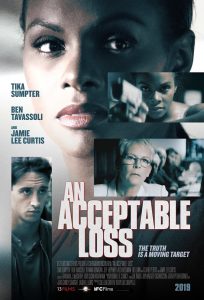
‘Destroyer’ makes the case for making amends
‟Destroyerˮ (2018). Cast: Nicole Kidman, Toby Kebbell, Tatiana Maslany, Bradley Whitford, Sebastian Stan, James Jordan, Zach Villa, Scoot McNairy, Beau Knapp, Jade Pettyjohn, Toby Huss, Shamier Anderson. Director: Karyn Kusama. Screenplay: Phil Hay and Matt Manfredi. Web site. Trailer.
The school of life can hand us some pretty tough lessons. If we fail in our efforts, we may come away from such experiences dejected. Those feelings can be particularly difficult to bear if we’re aware that our failings stem from wrongdoings that we might have (or should have) avoided, incidents that leave us wearing a badge of shame. And rectifying those missteps may prove quite the challenge as a downtrodden law enforcement professional discovers for herself in the gripping new crime thriller, “Destroyer.”
Los Angeles Police Detective Erin Bell (Nicole Kidman) looks like she’s been on the losing end of one too many altercations. The hard-drinking, overworked, sleep-deprived investigator comes across as being one step away from becoming a walking corpse. Yet, somehow, she manages to keep going, often following her own rules and keeping others, like her law enforcement partner (Shamier Anderson), out of the loop. Her renegade work habits have earned her a reputation among her peers. But, then, that’s due in part to what she did in the past and not just her current routine.
Sixteen years ago, when Bell was new to the job, for her first assignment, she was tasked to work an undercover operation with an experienced FBI agent, Chris (Sebastian Stan). They were charged with infiltrating a gang that roamed the nearby California desert engaging in assorted criminal activities, most notably bank holdups. The duo went in with the best of intentions but soon found themselves in over their heads, both in terms of the temptations all around them and the undeniable personal attraction that developed between them. A recipe for trouble was clearly in the offing – and on multiple fronts.
Those troubles didn’t end when the assignment concluded, either. Bell suddenly found herself the mother of a daughter, Shelby (Jade Pettyjohn), who has since grown up to be a rebellious wild child. Erin has virtually no relationship with the rambunctious adolescent; she has defiantly chosen to live with her mother’s ex-boyfriend, Ethan (Scoot McNairy), and routinely goes out of her way to irritate mom by spending most of her time with her older, surly, blatantly disrespectful squeeze, Jay (Beau Knapp). This scenario gives new meaning to the term “dysfunction.”
[caption id="attachment_10487" align="aligncenter" width="300"] Los Angeles Police Detective Erin Bell (Nicole Kidman) seeks to make amends for mistakes made on a case 16 years ago in director Karyn Kusama’s latest release, “Destroyer.” Photo by Sabrina Lantos, courtesy of Annapurna Pictures.[/caption]
Los Angeles Police Detective Erin Bell (Nicole Kidman) seeks to make amends for mistakes made on a case 16 years ago in director Karyn Kusama’s latest release, “Destroyer.” Photo by Sabrina Lantos, courtesy of Annapurna Pictures.[/caption]
But, if that weren’t bad enough, ghosts from that first fateful assignment have now come back into Bell’s life, dredging up painful memories and lingering regrets. One by one, she runs into former gang members (James Jordan, Zach Villa, Tatiana Maslany), some of whom have gone straight while others have continued their lawless ways. However, rather than allowing herself to be undone by these developments, Bell decides to take matters into her own hands, using these old contacts to help her make amends for her past. They put her in touch with a crooked attorney (Bradley Whitford) who can lead her to what she seeks most – the gang’s evil kingpin, Silas (Toby Kebbell). It’s a quest that Erin hopes will enable her to redeem herself for the events of so many years ago.
Thus begins the detective’s hard-fought odyssey to set matters to right. Through a series of flashbacks and the film’s main narrative, viewers discover how Bell arrived where she’s at, as well as why it’s so important for her to rectify past missteps. It’s a gritty path, to be sure, but it also holds the potential to be transformative and redemptive, considerations that Erin would like to see realized while she still has a chance.
When we stumble in life, we may think there’s no way to make up for it, that we’re fated to suffer unending and unforgiveable consequences. That can be especially true when we know we screwed up – and knew we were doing so at the time – leading us to believe that there may be no escape from our self-imposed loathing. But such is not the case. We always have an opportunity to right our wrongs to redeem ourselves. “Destroyer” shows us what it means to make the effort at doing just that. It may not be an easy process, as Erin finds out firsthand here. However, with the right intentions and a little determination, we’re likely to achieve what we set out to do, and there’s a lot to be said for that.
How well we succeed at this depends upon the beliefs we hold at the time we embark on such a journey. And that’s important given that our beliefs, thoughts and intents are the building blocks of the conscious creation process, the philosophy that maintains we draw upon these resources in shaping the reality we experience. If we believe we can succeed, there’s a good chance we will; but, if we have doubts, then the likelihood of a desirable outcome dwindles.
When it comes to Erin’s approach, she seems suitably motivated to press on to reach her goal, even in spite of her depleted condition. Years of not taking care of herself – most likely driven by beliefs in the regrets she’s been holding onto – have definitely taken their toll. Such conditions have also been exacerbated by the harsh conditions of her job. It’s a combination that has left her beaten down, the sort that would probably prompt most of us to just give up. But not Detective Bell; she know she’s got a job to do, and she’s set her mind on seeing it through.
This is true for Erin both professionally and personally. She fully realizes she hasn’t been the best mother to Shelby, and she sees the result of that in the relationship (or lack thereof) that she has with her daughter. She wants to make up for this, though that’s a tall order, given that she has to undo a lot of the damage that she caused over the years. Whatever success she attains will depend not only on her efforts, but also on how well this co-creation plays out, given that Shelby is just as much a part of what materializes as her mother is. Each will have to evaluate their beliefs about one another and whether or not they have a future together.
When faced with prospects such as these, we can always hold out hope that there’s a chance for redemption. And hope can be a potent belief in and of itself, one that can blossom into a powerful force if we allow it to express itself in fully manifested forms. For her sake, Erin had better put her faith in this notion while the opportunity presents itself.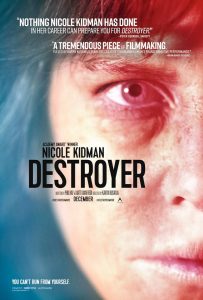
Although a bit sluggishly paced at times, this crime saga about the search for justice and redemption is a surprisingly good thriller with an excellent Golden Globe-nominated lead performance by Kidman in a decidedly different role. The clever storytelling format, coupled with a no-holds-barred approach to the action sequences, combine for an intriguing (and at times shocking) saga, made all the better by inventive editing, an eclectic but well-orchestrated mix of cinematography styles and a carefully measured sequence of revelation. Director Karyn Kusama’s latest has been getting an undeserved bad rap in some critical circles, but, thankfully, an increasing number of reviewers have been coming around on this one. Go see it for yourself and make up your own mind; you may well come away pleasantly surprised.
What we make of our second chances depends on how we approach them, particularly when it comes to recognizing the opportunities they represent. If we’re paying attention at all, we should realize that such breaks may not come our way all that often and that it would be in our best interests to jump on them when they appear. They just may make it possible for us to take off that badge of shame, something that should be especially important to someone who wears a badge for a living. Here’s wishing her (and us) luck.
Copyright © 2019, by Brent Marchant. All rights reserved.
